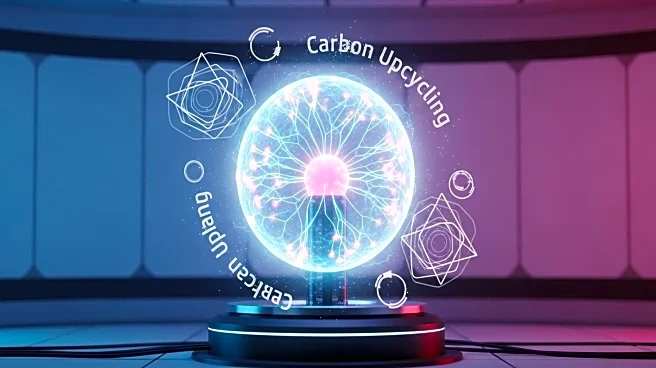What is the story about?
What's Happening?
Researchers at the McKelvey School of Engineering, Washington University in St. Louis, have made significant strides in carbon upcycling by using plasma technology. The team, led by Associate Professor Elijah Thimsen and staff scientist Alcina Johnson Sudagar, has demonstrated that carbon monoxide is a more effective starting material than carbon dioxide for producing organic acids. Their study, published in Green Chemistry, reveals that using non-thermal atmospheric pressure plasma in aqueous solutions significantly increases the yield of oxalic and formic acids from carbon monoxide. This method avoids the need for high pressures, temperatures, or chemical catalysts, offering a more environmentally friendly approach to carbon dioxide fixation and organic acid production.
Why It's Important?
This research is crucial as it presents a sustainable method to convert greenhouse gases into valuable products, potentially mitigating environmental impacts. By enhancing the efficiency of carbon dioxide conversion into organic acids, this technology could play a significant role in reducing industrial carbon footprints. The findings suggest a cost-effective and scalable solution for industries looking to adopt greener practices. The ability to produce organic acids efficiently could benefit sectors such as pharmaceuticals, agriculture, and manufacturing, which rely on these compounds for various applications.
What's Next?
The research team plans to further explore the reaction mechanisms and optimize the conditions for maximum yield. Future studies may focus on scaling the process for industrial applications and exploring other potential products that can be synthesized using this method. The success of this technology could lead to increased interest and investment in plasma-based carbon upcycling, potentially influencing policy and encouraging industries to adopt more sustainable practices.
Beyond the Headlines
The use of plasma technology in carbon upcycling highlights a shift towards innovative solutions in addressing climate change. This approach not only offers a method to reduce emissions but also creates economic opportunities by transforming waste into valuable resources. The research underscores the importance of interdisciplinary collaboration in developing technologies that address environmental challenges while supporting economic growth.
















